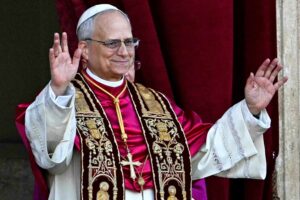Claim: (President) Mnangagwa has no power to fire a mayor from another political party
Source: Twitter
Verdict: True
Twitter has been thrown into a debate club following a story published by the Daily News on 14 February 2023 which states that President Mnangagwa has threatened to fire Harare City Mayor Jacob Mafume over poor service delivery, here and here.
People were left wondering whether or not the President has the legal and statutory mandate to force a city Mayor to vacate office.
It is true that the President, according to the Urban Councils Act, can fire a city mayor in the best interest of service delivery. In fact, he can instruct his Ministry to sack the whole council and replace it with a commission, according to this Act.
However, the Constitution has a clause that states that an independent tribunal has to be put in place to dismiss a sitting mayor.
The Urban Councils Act Section 54, and other such sections, are yet to be repealed in light of the constitutional pronouncements but “Section 10 of Part 4 of the sixth, schedule to the Constitution deals with pre- existing laws and provides as follows,
“10. Continuation of existing laws
Subject to this Schedule, all existing laws continue .irrforce but must be construed In conformity with this Constitution.”
Background
Service delivery in urban areas has been under rapid decline in recent years with councils failing to provide clean water, refuse collection and proper roads, amongst other basic services.
Local authorities, which are largely made up of opposition officials, blame the Zanu PF led government for meddling in the running of cities and continuously sabotaging their efforts.
On the other hand, the government says urban councils are inept, corrupt and incompetent.
To note, the central government is the responsible authority and runs the local authorities and municipalities. This was necessitated by the amendment of the Urban Councils Act in 2018 which gave the central government unfettered supervisory powers over local authorities through the Ministry of Local Government.
The control of urban municipalities by opposition parties has given rise to power struggles and amplified the tension between the ruling party led national government and local authorities.
In recent years, government has dismissed and suspended Harare mayors through the ministry of local governments such as Elias Mudzuri and Ben Manyenyeni.
Source: Techzim
Presidential legal powers to fire the Mayor
According to the Urban Councils Act, Section 54 (1) The President may require a mayor to vacate his office if the mayor—
(a) has been guilty of any conduct that renders him unsuitable as mayor; or
(b) is mentally or physically incapable of efficiently carrying out the functions of his office.
Furthermore, the Local Government Minister can relieve the whole city council of its duties and replace it with a commission.
The Act states that: Minister may appoint commissioner to act as council
(1) If at any time—
(a) there are no councillors for a council area; or
(b) all the councillors for a council area have been suspended or imprisoned or are otherwise unable to exercise all or some of their functions as councillors; the Minister may appoint one or more persons as commissioners, whether or not such persons are qualified through residence or ownership of property to become councillors, to act as the council in accordance with this section.
What does the Constitution say
When it comes to the dismissal of Mayors, Section 278 of the Constitution states:
2. An Act of Parliament must provide for the establishment of an independent tribunal to exercise the function of removing from office mayors, chairpersons and councillors, but any such removal must only be on the grounds of– a. inability to perform the functions of their office due to mental or physical incapacity; b. gross incompetence; c. gross misconduct; d. conviction of an offence involving dishonesty, corruption or abuse of office; or e. wilful violation of the law, including a local authority by-law
Precedent
In a case where Gweru mayor Hamutendi Kombayi challenged his dismissal as mayor of Gweru by the Minister of Local Government, the courts ruled that Section 278 of the Constitution is the supreme law on the dismissal of mayors from office.
In Hamutendi Kombayi and Ors v The Minister of Local Government, Public Works and National Housing and Ors HB 57116, the court had occasion to interpret the above provision and give effect to its meaning. The applicants in that case were suspended from office by the Minster in terms of s 114 ((1) (c) (d) (1) (11) of the Urban Councils Act on allegations of failing to discharge their functions as servants of the City of Gweru. Subsequent to this, a tribunal was set up to enquire into the charges preferred. The applicants obtained a provisional order suspending the disciplinary hearing pending confirmation of the order. Following this, the provisional order was confirmed and the court held that section 114 of the Urban Councils Act is in direct conflict with section 278 of the Constitution and inconsistent with it. Further, that s278 sets out a completely different regime in the removal of councillors from office and that the Minister’s act in suspending and attempting to set up a tribunal to deal with the charges involved in terms of s 114 was both unconstitutional and illegal. The court held further that s 278 of the Constitution speaks to a law establishing an independent tribunal to look into the misconduct allegations and that the legislature must comply with that requirement.
In the case between Bernard Gabriel Manyenyeni vs The Minister of Local Government, Public Works and National Housing and Attorney General on the former’s suspension the judge ruled that while a sitting mayor can be suspended by a Minister, they can only be dismissed by a tribunal set out for that purpose by an Act of Parliament. Until that tribunal has been set up, mayors can not be fired:
Parliament is mandated to comply with the dictates of the Constitution and put in place an Act of Parliament or a law establishing an independent tribunal to look into the removal of councillors. Dismissals of councillors can only be carried out once that law is in place. The purpose of the tribunal will be limited to looking into the suitability of a councillors, chairpersons and mayors to remain in office.
Conclusion
The claim that President Mnangagwa has no power to fire a mayor from another political party has been rated as accurate. He can not even fire a mayor from his own party, either. While theUrban Councils Act gives him that power, the Constitution sets out a different procedure for the dismissal of a sitting mayor. Previous court rulings have made it clear that mayors can only be dismissed by a tribunal set up for that purpose by an Act of Parliament.











